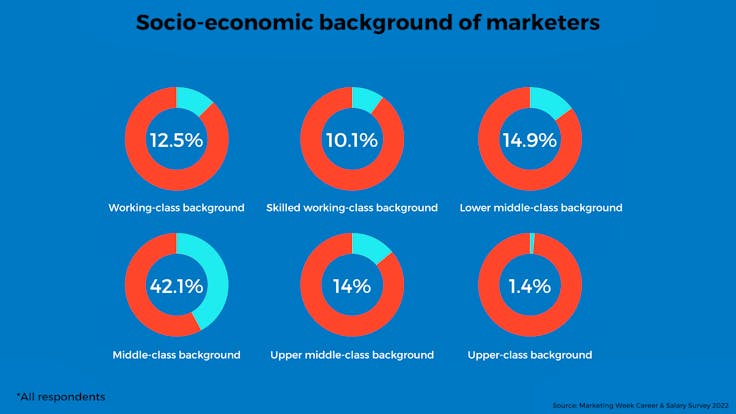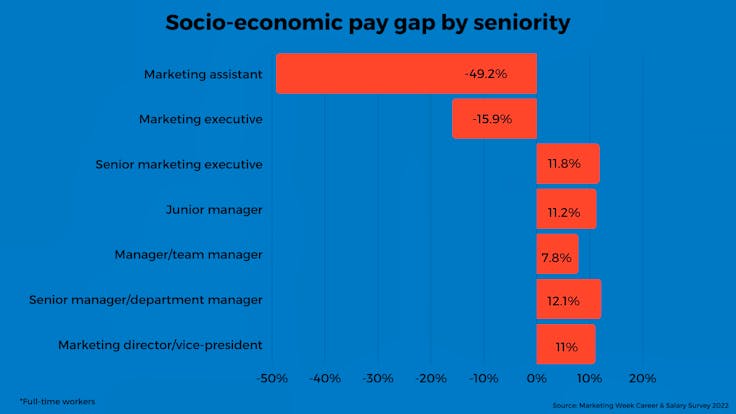A marketer’s socio-economic background dictates their earning potential, study finds
The statistics suggest marketers from working-class backgrounds are less likely to be in senior roles or earn as much as their peers from upper-class backgrounds.
 As the marketing industry faces up to the need for greater diversity of thought and experience, one issue that needs tackling is the socio-economic diversity of the profession.
As the marketing industry faces up to the need for greater diversity of thought and experience, one issue that needs tackling is the socio-economic diversity of the profession.
Characterised as overwhelmingly middle class, marketing still has work to do to broaden opportunities for people from diverse backgrounds, according to Marketing Week’s 2022 Career and Salary Survey.
Among the sample of 4,463 respondents, 12.5% come from a working-class background, while 10.1% identify as coming from a skilled working-class background.
A further 14.9% of marketers responding to the survey come from a lower middle-class background, while the largest proportion (42.1%) identify as middle class. A further 14% come from an upper middle-class background, while 1.4% identify as being upper class.
Based on this demographic information, the exclusive analysis reveals a mean socio-economic pay gap for full-time workers of 19.1%.
Looking across all marketing roles, the average salary for marketers identifying as coming from a working-class background is £47,700, with those from a skilled working-class background earning £46,800 and those from a lower middle-class background being paid £47,100 annually.
The average wage for marketers from a middle-class background is £55,100, with those from an upper middle-class background earning £66,400. For marketers identifying as coming from an upper-class background, the average annual wage is £76,600.
Revealed: Marketing’s 24% ethnicity pay gap
The analysis finds a relationship between the socio-economic background of marketers and the level of seniority they reach.
Marketers who identify as coming from either an upper middle-class or upper-class background are more likely to be senior managers/department managers (22.5%) than their peers from middle-class (21.1%) or working-class backgrounds (18.4%).
Looking at marketing directors/vice-presidents, the difference is more pronounced. Some 16.6% of marketers from upper middle-class or upper-class backgrounds are in marketing director/vice-president roles, versus 9.6% of their peers from middle-class and 6.7% from working-class backgrounds.
Some 4.1% of marketers from either an upper middle class or upper-class background responding to the survey are chief marketing officers, versus 1.7% from both middle-class and working-class backgrounds.
To get a sense of the pay gap by level of seniority, the analysis separated respondents into two cohorts based on the sample size need to reach the threshold for each level of seniority.
 The Career and Salary Survey finds marketers from working-class/skilled working-class/lower middle-class backgrounds only earn more than their middle-class/upper middle-class/upper-class peers in the most junior roles.
The Career and Salary Survey finds marketers from working-class/skilled working-class/lower middle-class backgrounds only earn more than their middle-class/upper middle-class/upper-class peers in the most junior roles.
Marketing assistants from working-class/skilled working-class/lower middle-class backgrounds earn on average £38,500, versus their middle-class/upper middle-class/upper-class peers who bring home £25,800. This equates to a pay gap of -49.2%.
Likewise, marketing executives from working-class/skilled working-class/lower middle-class backgrounds earn on average £32,000 compared to their counterparts from middle-class/upper middle-class/upper-class backgrounds, who earn £27,600. At this level of seniority, the pay gap equates to -15.9%.
However, as marketers from working-class/skilled working-class/lower middle-class backgrounds progress up the career ladder the pay gap flips.
Gender pay gap narrows amid ongoing Covid uncertainty
For senior marketing executives the pay gap is 11.8%, with marketers from working-class/skilled working-class/lower middle-class backgrounds earning £29,800 compared to their middle-class/upper middle-class/upper-class peers on £33,800.
Junior managers identifying as coming from working-class/skilled working-class/lower middle-class backgrounds earn on average £35,000 compared to their counterparts from middle-class/upper middle-class/upper-class backgrounds on £39,400 – a pay gap of 11.2%.
The pay gap narrows slightly at the manager/team manager level to 7.8%, with marketers from working-class/skilled working-class/lower middle-class backgrounds earning on average £44,700, versus the £48,500 earnt by their peers from middle class/upper middle class/upper class backgrounds.
The gap then widens to 12.1% for senior managers/department managers. At this level of seniority, marketers from working-class/skilled working-class/lower middle-class backgrounds earn on average £57,300. By comparison, marketers from middle-class/upper middle-class/upper-class backgrounds earn an average of £65,200.
The pay gap at the highest level of seniority studied for this analysis – marketing director/vice-president – is 11%, with marketers from working-class/skilled working-class/lower middle-class backgrounds earning on average £86,700. Their peers from middle-class/upper middle-class/upper-class backgrounds, however, earn on average £97,400.
Overall, the analysis shows that despite only representing a combined 15.4% of respondents, marketers from upper middle-class and upper-class backgrounds are more likely than their middle-class or working-class peers to rise to positions of seniority with higher earning potential.
*The average salaries for the Career and Salary Survey are calculated from full-time (35+ hours a week) respondents (88.2% of the total sample) providing their basic annual salary, excluding any additional benefits.
Click here to read analysis of marketing’s ethnicity pay gap








Comments